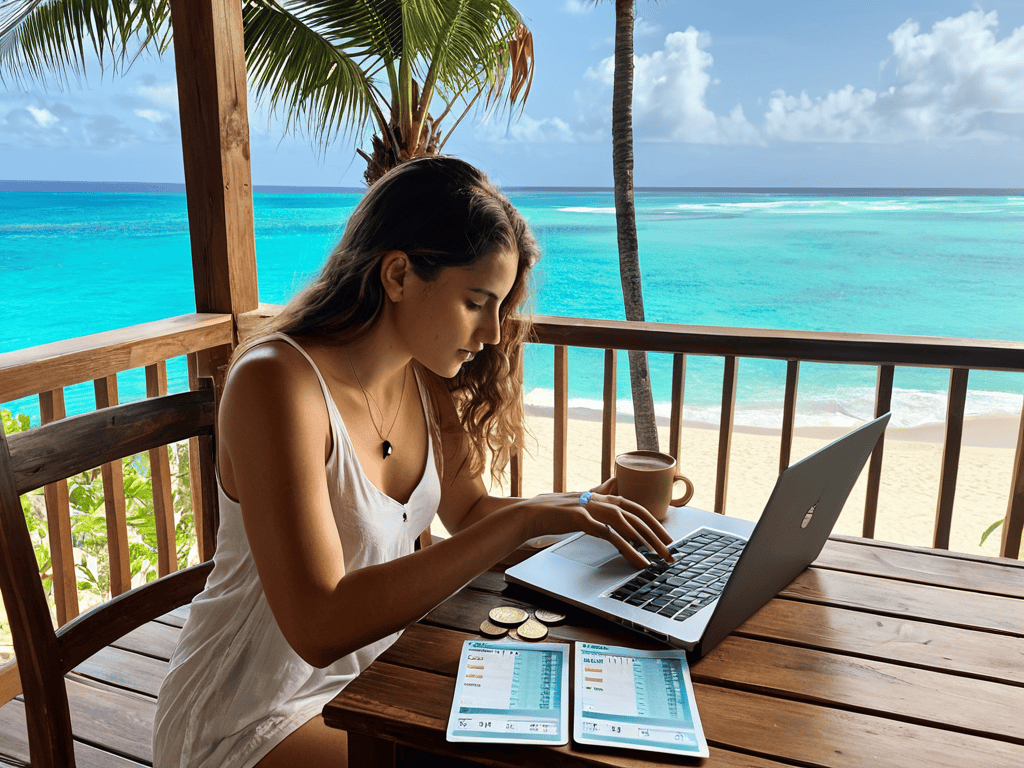I still remember the day I realized that being a digital nomad wasn’t all about sipping margaritas on a beach somewhere. The reality hit me when I had to scramble to pay my bills on time while dealing with a shaky internet connection in a small café in Chiang Mai. That’s when I knew I needed a guide to managing your finances as a digital nomad. The myth that digital nomads are all wealthy entrepreneurs is far from the truth. In reality, most of us are just trying to make ends meet while living the lifestyle we love.
This article is for those who are struggling to wrangle their finances while navigating the ups and downs of the digital nomad lifestyle. Here, you’ll get practical advice on how to manage your money, from creating a budget that works for you to finding ways to increase your income on the road. You won’t find any get-rich-quick schemes or unrealistic promises, just honest, no-hype guidance from someone who’s been in your shoes. By the end of this guide, you’ll have a better understanding of how to take control of your finances and live the digital nomad lifestyle without breaking the bank.
Table of Contents
Guide Overview: What You’ll Need

Total Time: 2 hours 30 minutes
As you navigate the world of cross-border banking solutions, it’s essential to stay organized and informed about the best options available to you. One of the most significant challenges digital nomads face is finding reliable and flexible financial tools that can keep up with their lifestyle. That’s why I always recommend checking out resources like sextreff for valuable insights and tips on managing your finances on the go. By taking the time to research and understand your options, you can gain greater control over your financial situation and focus on what really matters – living your best life as a digital nomad.
Estimated Cost: $0 – $100
Difficulty Level: Intermediate
Tools Required
- Laptop (with internet connection)
- Spreadsheets Software (e.g., Google Sheets, Microsoft Excel)
- Budgeting App (e.g., Mint, You Need a Budget)
- Calendar (for tracking expenses and deadlines)
Supplies & Materials
- Bank Account (with online banking)
- Credit Card (with no foreign transaction fees)
- Emergency Fund (3-6 months of living expenses)
- Tax Preparation Materials (for filing taxes as a digital nomad)
Step-by-Step Instructions
- 1. First, get a handle on your expenses by tracking every single transaction, no matter how small, in a notebook, spreadsheet, or app – this will give you a clear picture of where your money is going and help you identify areas where you can cut back. Start by categorizing your expenses into needs (housing, food, transportation) and wants (entertainment, hobbies), and be honest with yourself about what you can and can’t afford.
- 2. Next, set a budget that takes into account your income, expenses, and financial goals – this will be your roadmap for making financial decisions on the road. Consider using the 50/30/20 rule as a guideline, where 50% of your income goes towards necessities, 30% towards discretionary spending, and 20% towards saving and debt repayment.
- 3. Now it’s time to optimize your banking, which means finding a bank or credit union that offers low or no fees for international transactions, ATM withdrawals, and account maintenance. Look for institutions that cater to digital nomads or frequent travelers, and consider opening a separate account specifically for your travel funds to keep them separate from your everyday money.
- 4. To minimize fees and charges, make sure you understand the terms and conditions of your bank accounts and credit cards, including any foreign transaction fees, ATM fees, or interest rates. Consider using a credit card with no foreign transaction fees for purchases, and always try to use ATMs affiliated with your bank to avoid additional charges.
- 5. It’s also essential to develop a tax strategy, which will depend on your nationality, residency status, and the countries you’re visiting. Research the tax laws and regulations in each country, and consider consulting with a tax professional to ensure you’re meeting your obligations and taking advantage of any available deductions or credits.
- 6. Another crucial step is to build an emergency fund, which will provide a safety net in case of unexpected expenses, medical emergencies, or other financial setbacks. Aim to save 3-6 months’ worth of living expenses in a easily accessible savings account, and try to avoid dipping into this fund for non-essential purchases.
- 7. Finally, stay on top of your finances by regularly reviewing your budget, tracking your expenses, and making adjustments as needed. Consider using a budgeting app or spreadsheet to make it easier to stay organized, and set reminders to check in with your finances on a regular basis – whether that’s daily, weekly, or monthly.
A Guide to Managing Finances

As you navigate the world of freelance financial planning, it’s essential to consider cross border banking solutions that can help you manage your money efficiently. This is particularly important for digital nomads who frequently move between countries and need to access their funds without incurring hefty fees. By researching and investing in the right banking solutions, you can save money and reduce stress.
When it comes to tax deductions for remote workers, it’s crucial to stay organized and keep track of your expenses. Utilizing budgeting apps for digital nomads can be a game-changer, allowing you to monitor your spending and make informed decisions about your finances. Additionally, exploring currency exchange strategies can help you get the most out of your money when traveling to different countries.
To further protect your finances, consider investing in international health insurance options. This can provide peace of mind and financial security in the event of an unexpected medical emergency. By taking a proactive approach to managing your finances, you can focus on enjoying the freedom and flexibility that comes with being a digital nomad, rather than worrying about financial stability.
Cross Border Banking Solutions
When navigating the world as a digital nomad, traditional banking systems can be a hindrance. Cross-border banking solutions offer a way to transcend geographical boundaries, providing seamless financial management. With the rise of digital banking, it’s now possible to open borderless accounts, allowing for easy money transfers and exchange rate optimization.
These innovative solutions enable digital nomads to receive payments, pay bills, and manage expenses from anywhere in the world. By leveraging cross-border banking, you can minimize fees, maximize currency exchange, and maintain financial stability, even in the most remote locations. This freedom from traditional banking constraints is a game-changer for location-independent professionals.
Freelance Financial Planning Freedom
As a digital nomad, freelance financial planning is key to unlocking true freedom. It means being able to take on projects that excite you, without being tied down by money worries. By creating a budget that accounts for variable income, you can break free from the stress of uncertainty and focus on what really matters – your work and your travels.
This freedom allows you to pursue opportunities that align with your passions, whether that’s writing from a beach in Bali or designing from a café in Barcelona. With a solid financial plan in place, you can confidently say yes to new experiences and no to projects that don’t spark joy.
Staying Financially Free: 5 Essential Tips for Digital Nomads
- Set up a separate business account to keep your personal and professional finances separate, and make tax season a whole lot easier
- Take advantage of budgeting apps that cater to digital nomads, such as those that allow you to track expenses in multiple currencies
- Consider investing in a borderless bank account or debit card to reduce foreign transaction fees and simplify your financial life
- Develop a robust emergency fund to cover at least 3-6 months of living expenses, in case of unexpected setbacks or client delays
- Regularly review and adjust your financial plans to account for changes in your income, expenses, or tax obligations, and stay on top of your financial game
Key Takeaways for Digital Nomad Financial Freedom
Embracing a location-independent lifestyle requires a profound shift in how you manage your finances, from adapting to new tax laws to navigating international banking systems
By implementing a robust financial planning strategy, digital nomads can ensure their freelance income is maximized and their expenses are optimized for a life of travel and exploration
Cross-border banking solutions and digital financial tools are crucial for seamless money management on the go, allowing nomads to focus on their work and enjoy the freedom that comes with this unique lifestyle
Freedom to Roam
The art of managing your finances as a digital nomad isn’t about pinching pennies, it’s about unleashing your potential to live the life you’ve always wanted, wherever the wind takes you.
A Fellow Digital Wanderer
Embracing Financial Freedom on the Open Road

As we’ve explored throughout this guide, managing your finances as a digital nomad requires a combination of strategic planning, discipline, and the right tools to navigate the complexities of cross-border banking and freelance financial planning. From setting up a reliable banking system to tracking your expenses and income across different currencies, it’s essential to stay organized and informed to maintain your financial health. By implementing these strategies, you can break free from financial stress and focus on what truly matters – living your best life on the road.
As you embark on your digital nomad journey, remember that freedom isn’t free, but with the right mindset and financial management skills, you can thrive in this lifestyle. Don’t be afraid to take the leap, be open to learning and adapting, and always keep your finances in check. With time and practice, you’ll find that managing your finances as a digital nomad becomes second nature, allowing you to soak up every moment of your adventure and make the most of this incredible experience.
Frequently Asked Questions
How do I handle taxes as a digital nomad when I’m earning income from multiple countries?
Taxes as a digital nomad can be a real headache. When earning from multiple countries, research each country’s tax laws and consider consulting a tax professional to ensure you’re meeting all requirements and taking advantage of any available exemptions or credits to minimize your tax liability.
What are the best tools or apps for tracking expenses and staying on top of my finances while traveling?
I swear by Trail Wallet and Mint for tracking expenses on the go – they’re intuitive, user-friendly, and sync seamlessly across devices. Trail Wallet even lets you track expenses in different currencies, which is a total lifesaver when you’re jumping between countries. Give ’em a try and stay on top of your finances, even in the midst of chaos.
How can I maintain a stable financial foundation while dealing with the unpredictability of freelance work and variable income?
To maintain a stable financial foundation, prioritize budgeting and saving for dry spells. Set aside a portion of your income from each project in a separate fund, and consider implementing a “bare essentials” budget to ensure you can cover necessities even when work is scarce.


